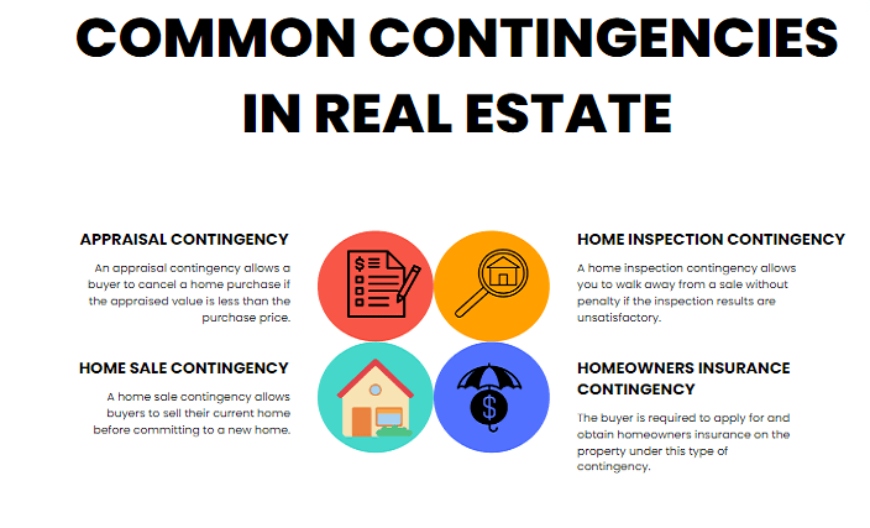What Does Contingent Mean In Real Estate? In-Depth Analysis
Dive into the intricacies of what does contingent mean in real estate. From financing to negotiations, master the art of smooth transactions for buyers and sellers.
Author:Habiba AshtonReviewer:Gordon DickersonJan 26, 20242.2K Shares48.8K Views

In the realm of real estate, the term "contingent" is a crucial aspect that defines the status and conditions associated with a property sale. Understanding what does contingent mean in real estateis fundamental for both buyers and sellers as it influences the progression of a transaction and outlines the various factors that may impact its finalization.
You have probably come across a variety of property listings with different selling statuses, such as for sale, closed, pending, and contingent, while searching for a home to buy.
These sales statuses all show the current phase of the property's sale procedure. To determine the properties that are for sale, it is necessary for a layperson to comprehend the meanings of various statuses and the distinctions between them. It will also assist you in understanding the offer's next steps more clearly.
Contingent In Real Estate
What does contingent mean in real estate? In the realm of real estate, the term "contingent" carries significant weight, serving as a key descriptor of the status of a property transaction.
When a property is labeled as contingent, it signifies that an offer has been made and accepted, marking a critical milestone in the buying or selling process. However, the completion of the deal is contingent upon the fulfillment of specific conditions outlined in the contract.
In simpler terms, a contingent property is one where the sale is not yet finalized, and certain provisions or contingencies must be met for the transaction to proceed smoothly. This phase is a period of due diligence during which both buyers and sellers navigate through potential challenges and uncertainties before committing to the finalization of the deal.
Consider a contingency as a provision in the buyer-seller purchase agreement. Buyer-provided contingencies will predominate. Nevertheless, the seller may also provide them.
There are several kinds of contingencies that can be placed in the contract, and each one has a significant influence on whether or not the deal closes. A contingent offer is an offer on a home that has one or more conditions attached to it.
A buyer who makes a non-conditional offer on a home does not put any conditions in their offer. Assume you are trying to sell your house.
Which would you prefer, an offer from a buyer subject to a few conditions being fulfilled, or an offer that is unconditional?
Without, is that correct?
This explains why in a hot real estate market where bidders are vying with one another, you'll see a lot of non-conditional offers.
A buyer must understand that by making a non-conditional offer, all contingencies are eliminated. Offers with conditions are more typical.
Any contingency that a buyer inserts in their offer must be removed prior to the closing date. This takes place on a form known as a contingency removal addendum to the purchase agreement.
In real estate, contingencies are important. This is the reason why. Once the buyer eliminates their stipulations, the buyer's good faith deposit is forfeited.
Soon after their offer is accepted, the buyer will pay a deposit to the escrow company. This is known as an escrow deposit or a good faith deposit.
If the buyer decides to back out of the deal after eliminating their conditions, they run the danger of forfeiting this money to the seller. Requiring the buyer to eliminate their contingencies is a significant obstacle for the seller.
Why? As a result of the buyer's increased commitment. For this reason, a seller will find a non-conditional offer on a home more appealing.
Types Of Contingencies
Financing Contingency
One of the most common contingencies is the financing contingency. This provision allows the buyer a specified period to secure financing for the property. If the buyer encounters challenges in obtaining a mortgage within the agreed-upon timeframe, this contingency provides an exit strategy without financial repercussions.
Inspection Contingency
The inspection contingency grants the buyer the right to conduct inspections on the property. This could include a comprehensive examination of the home's structure, systems, and overall condition. If significant issues are identified during the inspection, the buyer may request repairs, credits, or, in some cases, withdraw from the deal.
Appraisal Contingency
An appraisal contingency gives the buyer the flexibility to back out of the deal if the appraised value of the property is lower than the agreed-upon purchase price. Lenders often require appraisals to ensure that they are not financing a property for more than its appraised value.
Sale Contingency
For buyers who need to sell their existing home before purchasing a new one, a sale contingency is crucial. This provision allows the buyer to make an offer on a new property while contingent upon the sale of their current home. If their home doesn't sell within the specified timeframe, they may have the option to withdraw from the deal.
Title Contingency
Title contingencies focus on ensuring that the property has a clear title. This means that the title is free from any legal issues, disputes, or claims that could cloud ownership. If title problems arise during the contingency period, the buyer typically has the option to address the issues or walk away from the deal.
What Does Contingent Mean On A House?
In real estate, there are various kinds of contingencies, and each has its own set of duties and specifications. How likely the home is to close will be greatly influenced by understanding what kind of contingency it is.
Because North Carolina real estate differs from other states, it is unlikely that a home will be designated contingent and never close.
Once a contract is accepted, only the buyer may withdraw from it; both the seller and the buyer have contractual responsibilities to fulfill. Another offer is not acceptable to the seller. That still occurs, though, when a deal collapses.
Prior to submitting an offer, the majority of purchasers obtain a mortgage preapproval from a mortgage lender. This allows them to ascertain their eligibility for a mortgage before placing an offer on a property.
The accuracy of the information the buyer provided is not guaranteed by this preapproval letter. Buyers are frequently compelled to walk away from a property due to a mortgage contingency.
The preapproval letter may be meaningless if the buyer makes up information regarding their assets, income, or if they paid their taxes for the previous year. Most people may find a method to qualify for their house purchases thanks to cheap interest rates.
But there will be a lot more collapses of contingency contracts when the market reverses or interest rates start to climb!
When the buyer already has a contract in place and a closing date set for their current residence, then a contingency becomes applicable. The contingency safeguards the buyer in the event that the sale falls through for whatever reason, as the property is not marked as sold until closing.
Due to their contractual duties, sellers with this kind of contingency are not permitted to consider other bids on the property for a predetermined amount of time. Even if the house is listed as contingent, the seller is still open to receiving backup offers.
Implications For Sellers
When a property is labeled as "contingent" in real estate, sellers enter a phase that brings both advantages and challenges. Understanding the implications of contingent offers is crucial for sellers to navigate this stage effectively.
Advantages
- Accepting a contingent offer secures a potential buyer for the property. In a competitive market, this can be a significant advantage as it prevents the property from being taken off the market.
- Sellers have the opportunity to negotiate the terms of contingencies. This includes setting reasonable timeframes for inspections, appraisals, and other conditions. Skillful negotiation can lead to a more favorable outcome for sellers.
Challenges
- Contingent listings may be perceived as less attractive by other potential buyers. Knowing that a property is contingent may deter some buyers who are looking for a more straightforward transaction.
- Sellers face a level of uncertainty until all contingencies are met. The deal could fall through if the buyer encounters issues, potentially leading to the property being back on the market.
Implications For Buyers
For buyers, making a contingent offer is a strategic move that allows them to express serious interest in a property while providing an opportunity to conduct due diligence before fully committing to the purchase.
Advantages
- Contingencies provide buyers with protection. If unforeseen issues arise during the inspection or appraisal, or if financing proves challenging, buyers have the option to exit the deal without significant financial consequences.
- Buyers can negotiate with sellers based on the findings of inspections or appraisals. This negotiation leverage allows buyers to address concerns and potentially secure better terms.
Challenges
- In a competitive market, sellers may prefer offers without extensive contingencies. Buyers relying on contingencies may face challenges when competing with offers that have fewer or no contingencies.
- If buyers fail to adhere to the agreed-upon contingency timelines, they may risk losing their earnest money deposit. Timely communication and adherence to deadlines are crucial during the contingent phase.
Navigating Contingencies In Real Estate
When a property is marked as "contingent" in real estate, it signals a critical juncture in the transaction process. Navigating contingencies is a nuanced and essential aspect for both buyers and sellers, requiring strategic planning, effective communication, and a clear understanding of the contingencies involved.
The contingent phase is initiated when a buyer makes an offer on a property, and the seller accepts it, but the completion of the sale is contingent upon certain conditions being met. These conditions, or contingencies, are safeguards that allow both parties to assess and ensure the viability of the deal before finalizing the transaction.
Open and transparent communication is paramount during the contingent phase. Buyers and sellers must keep each other informed about the progress of contingencies, potential challenges, and any issues that may arise. Regular updates help build trust and foster a collaborative atmosphere.
Contingencies often lead to negotiations between buyers and sellers. Whether it's negotiating repairs based on inspection findings or revisiting the purchase price due to appraisal results, effective negotiation is key to a satisfactory resolution for both parties. Flexibility and a willingness to find common ground contribute to a smoother process.
Strict adherence to agreed-upon timelines is critical. Contingencies are often time-sensitive, and failing to meet deadlines can lead to complications. Buyers must complete inspections, secure financing, and address contingencies within specified periods, while sellers should respond promptly to any requests or concerns raised by the buyer.
Both buyers and sellers may benefit from having backup plans in place. Sellers could consider accepting backup offers, providing a safety net in case the primary contingent deal falls through. Buyers, on the other hand, might explore alternative financing options or keep an eye on other potential properties as a precaution.
Buyers should conduct thorough due diligence during the contingent phase. This involves completing inspections diligently and ensuring that financing is progressing as planned. Thorough due diligence provides buyers with a comprehensive understanding of the property's condition and helps avoid surprises later in the process.
FAQs
What Are Common Contingencies In Real Estate Transactions?
Common contingencies include financing, inspection, appraisal, sale, and title contingencies, each addressing specific conditions that must be satisfied for the sale to proceed.
How Does A Financing Contingency Work In Real Estate?
A financing contingency allows the buyer a specified period to secure a mortgage. If financing is not obtained within this timeframe, the contract may be voided without penalties.
Can A Buyer Back Out Of A Real Estate Deal After Making A Contingent Offer?
Yes, buyers can back out of a real estate deal if the contingencies are not met within the specified timelines. Common contingencies include inspections, appraisals, and financing.
What Happens If A Buyer Fails To Meet Contingency Timelines?
If a buyer fails to meet contingency timelines, they may risk losing their earnest money deposit. Timely communication and adherence to deadlines are crucial during the contingent phase.
How Can Sellers Protect Themselves With Contingent Offers?
Sellers can protect themselves by staying informed about the progress of contingencies, negotiating fairly, and considering accepting backup offers to safeguard their interests if the initial deal falls through.
How Often Do Contingent Offers Fall Through?
Several sources state that less than 5% of dependent offers are accepted. Broken offers might result from the seller refusing to drop their selling price following a low appraisal, or from the buyer not being able to obtain financing.
Conclusion
What does contingent mean in real estate? In the world of real estate, the term "contingent" carries significant weight, signaling a critical juncture in the buying or selling process. Understanding the various contingencies and their implications is essential for both buyers and sellers to navigate transactions successfully.
It requires careful consideration, effective communication, and, in some cases, adept negotiation skills to ensure a smooth and mutually beneficial real estate transaction.

Habiba Ashton
Author

Gordon Dickerson
Reviewer
Latest Articles
Popular Articles

